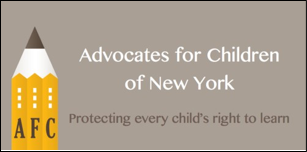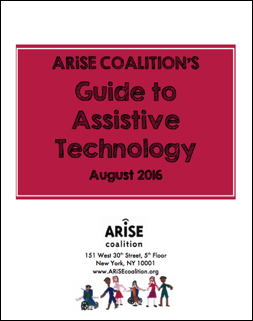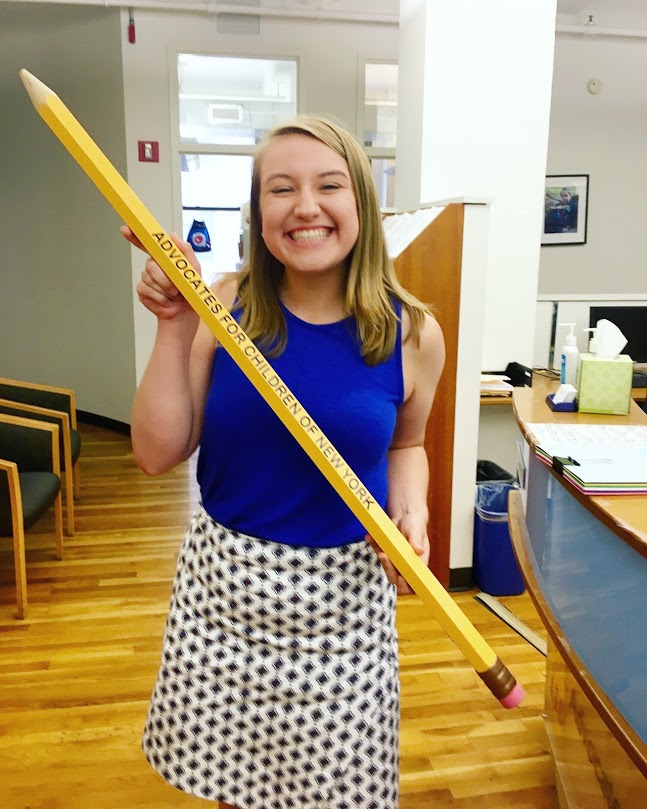Summer Archives
Lauren McCabeNew York, NY - Advocates for Children of New York (AFC) |
 Privilege vs. Right: Education Justice in Our Backyards
Privilege vs. Right: Education Justice in Our Backyards
This summer I had the opportunity to intern with Advocates for Children of New York (AFC) as part of my Ingram Summer Project. AFC is based in New York City, and serves NYC students by defending their rights. AFC has several projects that individually serve students with disabilities, students experiencing homelessness, students in the welfare system, immigrant students, students in the justice system, and overage students. They defend these students’ rights through direct legal representation, casework, advocacy, support through resources/publications, as well as indirectly through policy work on major, reoccurring issues.
 My main project with AFC this summer was to research, write, and publish one of their publications. This online/ print publication was an Assistive Technology (AT) Resource Guide for one of the disability rights community coalitions AFC supports called the ARiSE Coalition. The ARiSE Coalition serves as a liaison for community members to the NYC Department of Education (DOE), but also provides resources to the community like this publication. AT, in the simplest of terms, is any device or service that students need to help support their learning and encourage educational independence. AT devices ranges in technological complexity including: apps, pencil grips, speech-to-text processors, hearing amplification systems, speech output devices, audiobooks, and more. AT services include all the needs a student might have after acquiring an AT device, for example: training of the device, repairs of the device, etc. AT can be life changing for students, allowing them to speak, to write, to hear, and to learn. Unfortunately, they are also extremely expensive and difficult to acquire, especially in an already complex system like NYC’s DOE. Students are protected by federal law to obtain these devices, so their rights should in theory be guaranteed…right? This is not always the case. My guide then served the purpose of explaining what AT is through videos, pictures, and text, as well as laid out the rights students have, and the multistep process of getting the device/services. It sounds simple in theory. However, after eight weeks trying to comprehend it all myself, I quickly understood why families were struggling with the AT process.
My main project with AFC this summer was to research, write, and publish one of their publications. This online/ print publication was an Assistive Technology (AT) Resource Guide for one of the disability rights community coalitions AFC supports called the ARiSE Coalition. The ARiSE Coalition serves as a liaison for community members to the NYC Department of Education (DOE), but also provides resources to the community like this publication. AT, in the simplest of terms, is any device or service that students need to help support their learning and encourage educational independence. AT devices ranges in technological complexity including: apps, pencil grips, speech-to-text processors, hearing amplification systems, speech output devices, audiobooks, and more. AT services include all the needs a student might have after acquiring an AT device, for example: training of the device, repairs of the device, etc. AT can be life changing for students, allowing them to speak, to write, to hear, and to learn. Unfortunately, they are also extremely expensive and difficult to acquire, especially in an already complex system like NYC’s DOE. Students are protected by federal law to obtain these devices, so their rights should in theory be guaranteed…right? This is not always the case. My guide then served the purpose of explaining what AT is through videos, pictures, and text, as well as laid out the rights students have, and the multistep process of getting the device/services. It sounds simple in theory. However, after eight weeks trying to comprehend it all myself, I quickly understood why families were struggling with the AT process.
 The majority of my summer was developing the AT guide, but I did have the opportunity to delve into other areas of AFC as well. I was able to take on cases through AFC’s educational rights Helpline; shadow attorneys and advocates to various family, NYC DOE, City Hall, and policy meetings; go on school visits, and help families access service providers. This direct service led me to travel to all of NYC’s five boroughs, giving me perspective about NYC as a whole. Throughout these experiences, I encountered violations of rights that were shocking, for example: students with mental health issues that were ignored by the school, immigrant students that were discriminated against, students whose school buses wouldn’t pick them up at shelters, and special education students who were given the bare minimum of supports. These situations left parents hopeless, wanting to trust in an education system that was failing their children. However, these stories helped me to understand why AFC exists, and quickly taught me the impact of my guide as well. I realized that my guide wasn’t just a research paper on AT, but instead was truly a tool to bridge the understanding for families. Everything I wrote or presented in the guide I made sure to make as accessible as possible because that is what these families needed.
The majority of my summer was developing the AT guide, but I did have the opportunity to delve into other areas of AFC as well. I was able to take on cases through AFC’s educational rights Helpline; shadow attorneys and advocates to various family, NYC DOE, City Hall, and policy meetings; go on school visits, and help families access service providers. This direct service led me to travel to all of NYC’s five boroughs, giving me perspective about NYC as a whole. Throughout these experiences, I encountered violations of rights that were shocking, for example: students with mental health issues that were ignored by the school, immigrant students that were discriminated against, students whose school buses wouldn’t pick them up at shelters, and special education students who were given the bare minimum of supports. These situations left parents hopeless, wanting to trust in an education system that was failing their children. However, these stories helped me to understand why AFC exists, and quickly taught me the impact of my guide as well. I realized that my guide wasn’t just a research paper on AT, but instead was truly a tool to bridge the understanding for families. Everything I wrote or presented in the guide I made sure to make as accessible as possible because that is what these families needed.
My biggest takeaway from this summer is that education in this country is not a right, it is a privilege. Many of us grew up knowing we had a classroom and means to learn each day. Yet students in our own backyards don’t have that equal opportunity. I’m inspired, motivated, and humbled by my experience, and am thankful that organizations like AFC exists to help work towards opportunity, futures, and simply the right to learn.
For more, please visit Advocates for Children of New York.
